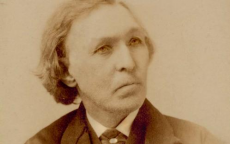
William Topaz McGonagall was a Scottish weaver, actor, and most significantly, poet. Actually, he is widely recognised as the worst professional poet in all of history. Both The Tay Bridge Disaster and The Famous Tay Whale remain examples of the most comic misuse of poetic verse in existence. Whilst some with such a talent for terrible poetry may have produced boring, unrhythmic verse, McGonagall instead wrote the most unintentionally amusing poems. He inspired groups throughout Scotland, who persuaded the man to recite from his works, once more being involuntarily hilarious by calling on his skills as a comic actor, rather than a serious one. So, you may ask, why is the worst professional poet in history deserving of the title ‘inspirational’? Despite being laughed at, this man continued to produce verse after verse—and though many may use his work as an example of how not to write, the name McGonagall is nonetheless known by many.
McGonagall originally trained as a weaver, following in the footsteps of his father. Despite marrying in 1846, raising a large family and prospering in his work, McGonagall seemed to feel that something was missing. He began by exploring the world of acting; he was given the title role of Macbeth in a local production at the Mr. Giles’ Theatre. Of course, he only received the part as he paid for the privilege. According to records, the theatre was filled with family and friends who, knowing McGonagall, expected a rather humorous disaster. They were not disappointed—the play (SPOILERS) should have ended with the death of Macbeth, but McGonagall refused to die, believing the actor playing Macduff was trying to upstage him.
By the 1870s, the family was struggling. Rather than continue his profession, however, McGonagall claimed that in 1877 “I discovered myself to be a poet”. As a poet, he attempted to find a sponsor, writing to Queen Victoria. In return it seems he received an exceedingly standardised rejection letter, thanking him for his contribution. This letter was, however, seemingly misinterpreted: McGonagall believing that although the Queen would not sponsor him, she had enjoyed his poetry. In 1878, he walked from Dundee to Balmoral, about 60 miles, over mountains and through a violent storm, in order to perform for Queen Victoria. He presented the letter to the guards, but was refused entry, and told to return home. Yet this did not deter him.
Attempting to seek his fortune twice by sailing to London in 1880, and New York in 1887, McGonagall survived off donations from his friends. Throughout all this, he seemed oblivious to the general opinion of his poetry. His efforts to sell it seemed to be continuously unsuccessful, despite some brief popularity between 1895 and 1900. He died penniless, and wandering the streets of Edinburgh in 1902, and was buried in an unmarked grave. Eventually, however, it was discovered, marked, and a plaque was placed at the sight of his death. Through all his trials, McGonagall remained positive, and kept writing, despite what everyone thought. And he is still remembered today, albeit not for good poetry, but nevertheless, for poetry. It seems appropriate to finish with the concluding stanza from McGonagall’s most famous poem, The Tay Bridge Disaster:
I must now conclude my lay
By telling the world fearlessly without the least dismay,
That your central girders would not have given way,
At least many sensible men do say,
Had they been supported on each side with buttresses,
At least many sensible men confesses,
For the stronger we our houses do build,
The less chance we have of being killed.
Images: https://novocastria.files.wordpress.com/2012/08/img_02751.jpg

0 Comment:
Be the first one to comment on this article.